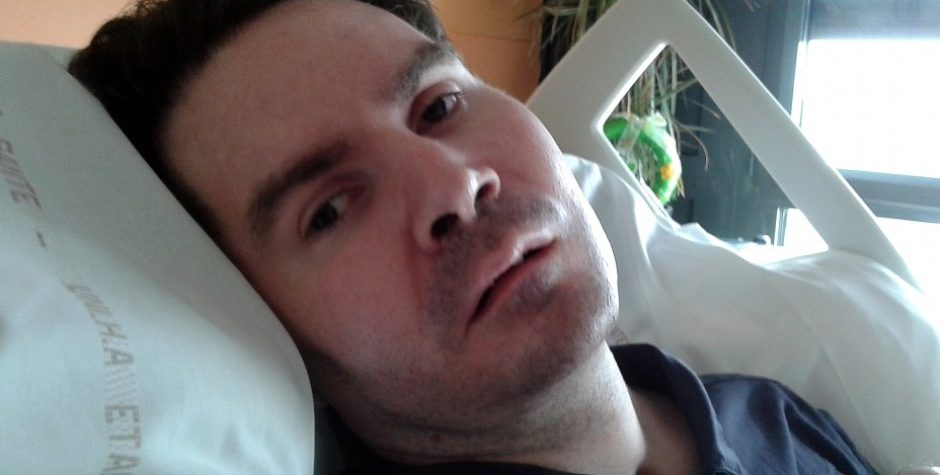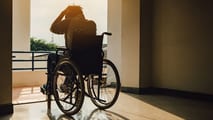

Answers to Ten Common Statements Justifying the Euthanization of Vincent Lambert
Ten Answers about Vincent Lambert
The determination of Vincent Lambert’s parents towards their son’s life, despite his heavily disabled condition, arouses admiration but also a lot of misunderstanding and contempt.
At a time when Vincent is literally dying of hunger and thirst, these questions and objections, which are either general or particular to Vincent Lambert's case, deserve answers:
- “His mother should just take her son home and care for him herself!”
- “Nobody would want to live like this, it's not a life!”
- “He said that he did not want to be kept in such a state, respect his will!”
- “He is no longer conscious of himself; he is a vegetable!”
- “No to Endless Medical Treatment!”
- “I am against euthanasia, but I’m not sure that’s actually happening here…”
- “His mother is a traditionalist Catholic who makes her son suffer as a consequence of her beliefs—this is revolting!”
- “What enormous costs to the Social Security System!”
- “The United Nations has nothing to do with this case. The requirements of its Committees carry no weight in France!”
- “All these years of procedures constitute a massive waste of judicial and medical resources!”
1. “His mother should just take her son home and care for him herself!”
As a matter of fact, his parents wish to do so and several medical authorities have recognized that Vincent could be perfectly cared for in his parents’ home. They have made several requests to the French courts and this has been expressly and systematically refused. This is the first fundamental problem that is specific to this case: Vincent Lambert is not in a care unit adapted to his situation. He should not be in a palliative care service but in a house or clinic that is adapted and specialized for his disability. Some hospitals and private clinics specialized in this type of disability have offered to welcome Vincent Lambert into their facilities. This was also systematically refused.
In a collective opinion page on April 18, 2018, seventy “doctors and professionals specialized in the care of persons with cerebral palsy in a vegetative or pauci-relational state” said about Vincent Lambert that “it is obvious that he is not at the end of life”. The average length of stay in a palliative care unit in France is 16 days. Vincent has been living in a palliative care unit for 10 years. This does shows that he is not at the end of his life.
2. “Nobody would want to live like this, it's not a life!”
Indeed, nobody would want to live in such a situation. It is however a sophism to conclude that one should therefore euthanize a person living in such a situation.
Indeed, it is not because one suffers from one or several illnesses that one would necessarily want to die. Nobody wants to lose an arm in a work accident and become unemployed. However, if such a thing happens, a person does not necessarily lose the will to live. The response of an empathic society should not be to keep a person in his pain by inviting him to put an end to his life so as not to suffer anymore, but to treat him, and to help him understand that life is worth living.
In addition, judging the value of a person’s life is dangerous. What criteria allow to say that a life is worth living? Are they universal and accepted by everyone?
3. “He said that he did not want to be kept in such a state, respect his will!”
This is a point heavily discussed in this case. In fact, he did not write advance directives, although he was a nurse and well-informed of such a possibility.
Moreover, his wife alone claims to report what he would have said, as well as a brother who claims to report his “last wishes”. All his other brothers, sisters, and even his half-nephew stated that Vincent had never said anything to them about it. They all, however, deduced this alleged desire not to be kept alive by virtue of his personality. Is this deduction reliable?
The reality is that most of us have already told our loved ones that we would not want to live in a disabled or declined state. This does not mean, however, that we would want to be euthanized in this case. Even when expressing such a desire clearly while one is in good health, the unanimous experience of caregivers is that once the accident has occurred, the will evolves because the will to live is often the strongest.
Vincent Lambert had his car accident in 2008. But it was only in 2013, after a long conversation with Dr. Kariger, favourable to “a path of end of life”, that Rachel Lambert claimed such was the will expressed by her husband. She had not previously made any public comments about that.
On this basis, Dr. Kariger initiated the first euthanasia attempt that year on Vincent Lambert. As the doctor continued to hydrate him a minima (250-300mL / day), Vincent Lambert survived hunger and thirst for 31 days. This resilience, which has been maintained until now, is a serious indication of a personal will to live. This is what all the specialist caregivers of these patients say, and according to their experience, patients like Vincent Lambert who no longer want to live or who “drop out psychologically” die in a few days, or even a few hours, without warning signs.
4. “He is no longer conscious of himself; he is a vegetable!”
The question is debated but the various diagnoses established throughout the judicial process indicate that Vincent Lambert is in a chronic state of altered consciousness that includes states ranging from “vegetative” to “minimally conscious state”. He breathes alone, sleeps and wakes up. He is fed by a gastrostomy (feeding tube). His movements and facial expressions are difficult to interpret medically, but there is no doubt that there is a possible interaction with people, however small it may be. For example, he turns his eyes and head towards his mother when she calls him. Several videos taken by his mother attest to his reactions to solicitations and at least a clear awakening of Vincent Lambert, demonstrating that he is not a “vegetable”.
If we consider Vincent Lambert to be in a vegetative state such that he cannot express anything nor even possess awareness of his surroundings – which is contested by his parents, although to this day they cannot claim to know his true will or claim with certainty that would prefer to die. This makes the euthanasia of Vincent Lambert even more shocking: the traditional wisdom is that “when in doubt, the best thing is not do anything”. Here, despite being in doubt, they have already begun to kill him. And if Vincent Lambert were really nothing but a vegetable who does not feel anything and is no longer aware of his environment, why sedate him so that he does not “suffer anymore”?
5. “No to Endless Medical Treatment!”
We entirely agree. However, in the case of Vincent Lambert, he does not need nor is receiving medical treatment. He does not take any medications, undergo regular surgeries, or rely on a respirator to breathe. He is not at the natural end of his life. On 21 November 2018, the medical experts appointed by the Courts affirmed that the “fundamental and primary needs [of Vincent Lambert] do not reveal endless medical treatments or any unreasonable obstinacy toward that end”, and that Vincent Lambert’s medical situation “call[ed] for no emergency measures.”
Admittedly, his feeding and nutrition is accomplished by a tube. This method of administration constitutes a form of care. But what is administered is not medication, nor treatment, nor artificial: it is food, no different than that needed by all other human beings. In addition, in Vincent Lambert’s specific case, it is necessary to note that he is able to swallow small quantities of food. However, his doctors have never sought to stimulate this ability in order to encourage the recovery of his faculties.
Thus, to deprive Vincent Lambert of his nutrition is not to “let him go” or to “let him die”, but to purposefully cause his death. It is erroneous and alarming to see in the assisted nutrition of a disabled person the existence of “unreasonable obstinacy.” There are thousands of people in France today who cannot feed themselves, some of whom are merely ill or extremely aged. Would it be right to let them die as well simply by refusing to feed them?
6. “I am against euthanasia, but I’m not sure that’s actually happening here…”
Yes, it is certainly euthanasia that is occurring here: a decision has been made by a third party, Dr. Sanchez, to deliberately deprive a person of food and water in order to bring about his death. Refusing to feed and hydrate a disabled person in order to provoke his death because of the serious nature of his disability constitutes, for a doctor, a denial of the Hippocratic Oath.
If we do not stand firm on general moral principles, we put ourselves directly onto a slippery downhill slope. Admittedly, the medical situation of Vincent Lambert is terrible and difficult, but if he can be euthanized by the will of his guardian and his doctor, why shouldn’t people who have been in a coma for 20 years also be permitted a “worthy” end? And why even wait 20 years? If receiving nutrition by a device is a treatment, why not stop the treatment of other people who cannot feed themselves?
The direction of this slope is that of Belgium, where euthanasia is legally accessible to individuals suffering from depression and other mental disorders, including minors.
7. “His mother is a traditionalist Catholic who makes her son suffer as a consequence of her beliefs—this is revolting!”
When people say it is better to euthanize because “no one would want to live in such a condition,” these people are essentially imposing their convictions on Vincent. As soon as Vincent Lambert could no longer express his own will, any actions taken toward him necessarily became imposed, whether in favour of life or of death. Why would an atheist who does not believe in life after death have any greater right to impose his beliefs on Vincent? It is completely absurd that some people mock the beliefs of Vincent Lambert’s parents in assessing that, once dead, he will not have to suffer anymore. What do they really know about his suffering, anyway?
8. “What enormous costs to the Social Security System!”
Yes, but to base a judgment of life or death on financial considerations is dangerous—for everyone. What about all the people who are stuck in a coma? Or those suffering from serious forms of cancer, whether in the advanced or beginning stages? Should we set an age past which the right to live becomes too expensive for society to support, thereby justifying the euthanasia of all individuals who live past that age? This goes directly against the fundamental principle of our (French) Social Security System: to make contributions according to our level of ability and later receive care in accordance with our needs.
In the specific case of Vincent Lambert, given that he had his car accident while driving from his home to his place of employment, his care is primarily financed by his employer’s insurance company, and not actually “by our taxes”. In addition, the daily fees charged by a specialized facility to which he would be better adapted are two to three times less than that of hospice care. The transfer requested by his parents for the last several years would reduce these costs just as much.
9. “The United Nations has nothing to do with this case. The requirements of its Committees carry no weight in France!”
The United Nations is an international organisation that the Member States have themselves created and accepted by ratifying a constitutional treaty. Indeed, according to our Constitution and the jurisprudence of the Constitutional Council, international treaties ratified by France are integrated into our legal system and have binding force superior to domestic laws.
In this case, the moment France signed the Convention on the Rights of Persons with Disabilities and its Optional Protocol, the government committed itself, according to our own national laws, to recognising that “handicapped persons have the right to enjoy the best possible conditions of health without discrimination based on their disability” and to “prevent all discriminatory refusals to provide medical care or services or nutrition and hydration based on a person’s disability”.
When Vincent Lambert’s parents failed to obtain recognition of their disabled son’s right to life and to care from the French government, it was legitimate for them to bring their case before the Committee on the Rights of Persons with Disabilities, which is charged with ensuring the proper application of said Convention by France.
France has an obligation to respect the request of this Committee to not provoke the death of Vincent Lambert because it has recognised the power of this Committee to prescribe “necessary interim measures to avoid irreversible harm to victims of a presumed violation.” In addition, respect for these measures is a condition of the effectiveness of the right to recourse and appeal in this instance.
10. “All these years of procedures constitute a massive waste of judicial and medical resources!”
No one goes through years of judicial proceedings because they want to or find it pleasing, and this was not what Vincent Lambert’s parents imagined nor wanted either.
At the root of their will to protect the life of their son is obviously parental love, but there is also the conviction to fight injustice and to work for the protection of certain principles and the lives of other people who are in situations similar to that of Vincent Lambert.
It is the injustice and scandal of this case – that of seeing their disabled son suffer from thirst and starvation to the point of death by the decision of a doctor and the judicial system – that morally justify pursuing all possible forms of recourse available under French and International law.
The obstinacy in this case is neither therapeutic nor judicial, it is that of ensuring Vincent Lambert’s death.











